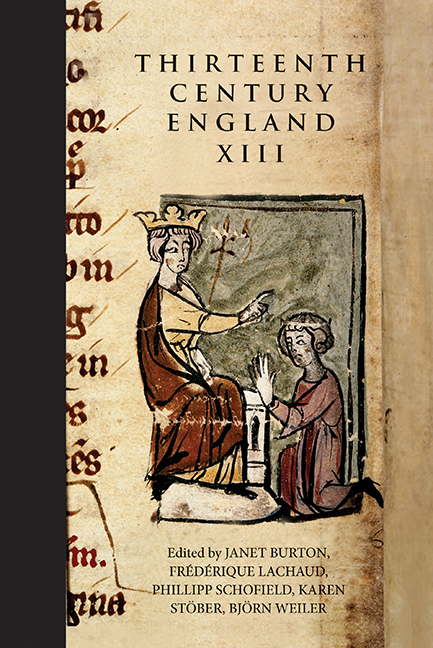Book contents
- Frontmatter
- Contents
- List of Illustrations
- Preface
- Contributors
- Abbreviations
- Political Ideas and Dialogue in England in the Twelfth and Thirteenth Centuries
- Peripatetic and Sedentary Kingship: The Itineraries of John and Henry III
- Peter of Aigueblanche's Support Network
- A Captive King: Henry III between the Battles of Lewes and Evesham, 1264–5
- The Conflictus inter Deum et Diabolum and the Emergence of the Literature of Law in Thirteenth-Century England
- Prosecuting Ravishment in Thirteenth-Century England
- John of Crakehall: The ‘Forgotten’ Baronial Treasurer, 1258–60
- Credit Finance in Thirteenth-Century England: The Ricciardi of Lucca and Edward I, 1272–94
- (Socio)linguistic Realities of Cross-Channel Communication in the Thirteenth Century
- The Treaties of Paris
Preface
Published online by Cambridge University Press: 15 September 2017
- Frontmatter
- Contents
- List of Illustrations
- Preface
- Contributors
- Abbreviations
- Political Ideas and Dialogue in England in the Twelfth and Thirteenth Centuries
- Peripatetic and Sedentary Kingship: The Itineraries of John and Henry III
- Peter of Aigueblanche's Support Network
- A Captive King: Henry III between the Battles of Lewes and Evesham, 1264–5
- The Conflictus inter Deum et Diabolum and the Emergence of the Literature of Law in Thirteenth-Century England
- Prosecuting Ravishment in Thirteenth-Century England
- John of Crakehall: The ‘Forgotten’ Baronial Treasurer, 1258–60
- Credit Finance in Thirteenth-Century England: The Ricciardi of Lucca and Edward I, 1272–94
- (Socio)linguistic Realities of Cross-Channel Communication in the Thirteenth Century
- The Treaties of Paris
Summary
By convening in Paris, the 2009 meeting broke with precedent: this was the first Thirteenth-Century England conference to be held outside the British Isles. We very much hope that this will set a precedent, and that in future other meetings, too, will reflect by their venue the degree to which England formed part of a larger cultural, political, religious, economic and social whole. In 2009, the specific occasion for crossing the Channel was the 750th anniversary of the Treaty of Paris, the agreement in which Henry III surrendered his claim to Normandy, Anjou and Poitou, and which inaugurated a period of relative and, though temporary, nonetheless largely unparalleled calm in dealings between the rulers of England and France. This context is reflected in the papers published here, many of which focus on dealings between the kingdoms of England and France and their inhabitants, with a separate group of papers specifically on the Treaty of Paris and its aftermath. Yet, in keeping with the traditions of the conference, the venue did not determine the range of topics discussed.
The papers on the Treaty of Paris, which sat at the heart of the conference and are published here as a self-contained group, reflect the variety of ways in which the Treaty and its associated history, especially its later history, can be addressed. Daniel Power considers the ways in which an Anglo-Norman aristocracy struggled to elide their dynastic ambitions with the machinations of high politics in this period. The movement of familial land and access to it was constrained by the claims of the separated English and French states; while the Treaty of Paris did not occasion a final rupture and in fact served to ease some cross-Channel management of family lands, the futures of English and French dynasties were frequently quite discrete by the later thirteenth century. This Anglo-Norman tension over rights and property is also evident in William Chester Jordan's paper, in which he discusses the significance of the dispute concerning the status of the small Gloucestershire priory of Deerhurst following its purchase by Earl Richard of Cornwall in 1250 from the French abbey of St Denis, of which Deerhurst had been a dependency since the days of Edward the Confessor.
- Type
- Chapter
- Information
- Thirteenth Century England XIIIProceedings of the Paris Conference, 2009, pp. ix - xiPublisher: Boydell & BrewerPrint publication year: 2011

